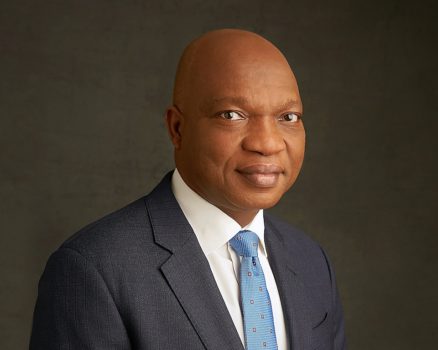Shell Petroleum Development Company of Nigeria is making good progress steadily towards achieving its target of Goal Zero in oil spills in the Niger Delta region.
The progress is made possible through a solid strategy, active partnerships, closer community engagements, bold security and new surveillance equipment.
This cheering news is contained in an annual review, published in the Nigerian Briefing Notes available online via ( https://www.shell.com.ng/media/nigeria-reports-and-publications-briefing-notes.html)

Osagie Okunbor, SPDC Managing Director
The report indicates that in 2019, the SPDC JV reduced operational spills to their lowest levels, significantly reduced breaches from wellheads and cleaned up more spill sites than ever before.
The progress recorded are in the following areas of Improving performance, Preventing illegal activity, Response and investigation, Improving remediation and Clean-up in Ogoniland.
According to the Nigerian Briefing Notes, the energy company (SPDC JV) reported seven operational spills in 2019, a 46.6 percent decrease over the previous year (when it recorded 15 such spills).
The data available showed that in 2019, theft and sabotage resulted in 156 spills. In 2018, the figure was 109.
The SPDC JV has a policy that when a leak is identified, the team responds to contain any spilled oil and clean up. In 2019, SPDC JV remediated 130 sites.
The SPDC JV is working to eliminate spills from its operational activities, remediate past spills and prevent spills caused by crude oil theft, sabotage of pipelines or illegal oil refining. While SPDC operates to the same technical standards as other Shell companies globally, illegal activities continue to inhibit a normal operating environment.
6. Past spills from operational and illegal activities have been well documented, resulting in a clean-up programme and, where appropriate, compensation.
The report further details efforts on improving performance, response and investigation, improving mediation, bioremediation using land farming techniques and preventing illegal activities.
CLEAN UP IN OGONILAND:
– SPDC is working with the relevant stakeholders to implement the 2011 United Nations Environmental Programme (UNEP) Report on Ogoniland.
– Over the last eight years, SPDC has taken action on all, and completed most, of the UNEP recommendations addressed specifically to it as operator of the joint venture.
– The UNEP report recommended the creation of an Ogoni Trust Fund with $1 billion capital to be co-funded by the Nigerian government, the SPDC JV and other operators in the area.
– The SPDC JV remains fully committed to contributing its share of $900 million over five years to the fund and made $10 million available in 2017 to help set up the Hydrocarbon Pollution and Remediation Project (HYPREP), an agency established by the federal government to lead the clean-up effort.
– In 2018, the SPDC JV deposited a further $170 million into the escrow account to fund HYPREP’s activities, to complete its first-year contribution of $180 million.
– The SPDC JV in 2019 contributed the next tranche of $180 million. At the end of 2019, the total contribution made was $360 million which represents the full amount due for the two years.
– SPDC continues to work with the Bodo community and others to clean up areas affected by two operational spills in 2008. A memorandum of understanding granting SPDC access to begin the clean-up was signed in 2015 and two contractors were selected to conduct the clean-up, overseen by an independent project director.
– The clean-up consists of three phases: 1) removal of free phase surface oil, 2) remediation of soil, 3) planting of mangroves and monitoring.
■ The removal of surface oil started in September 2017 and was completed in August 2018.
■ Field remediation activities started in November 2019 following a contract procurement process to select remediation contractors.
■ 800 community workers have been medically checked, assessed for their swimming ability to ensure they can safely respond to incidents in rivers and creeks, and trained to International Maritime Organisation oil spill response Levels one and two. Remediation is expected to take around 18 months. The clean-up will only be successful if the repeated re-contamination of cleaned-up sites from illegal third-party activity stops.
SPDC ACTIONS ON UNEP RECOMMENDATIONS:
Since 2011, SPDC has taken action on all the recommendations addressed specifically to it as operator:
■ Re-assessed 15 SPDC JV sites mentioned in the UNEP report and remediated further where required with the sites certified by government regulators.
■ Completed an inventory and physical verification of assets for decommissioning and working with joint venture partners and the FGN to develop a decommissioning plan for these assets.
■ Completed a comprehensive review of its oil spill response and remediation techniques and made a number of improvements in line with industry best practices.
■ Collaborated with the Rivers State Government to deliver water to impacted communities and built water facilities, which are expected to be upgraded as part of HYPREP’s planned activities.
■ Trained contractors on clean-up and remediation techniques and assigned specialist supervisors to a number of project sites to ensure effective oversight and compliance.
■ Continuing to carry out regular aerial monitoring of the JV’s facilities in Ogoniland, including the creeks and pipelines, to identify new incidents or activities (such as theft and sabotage) which may result in environmental damage.
■ Providing improved public access to information such as Joint Investigation Visit reports and spill incident data via a spills information web site
(https://www.shell.com.ng/sustainability/environment/oil-spills.html).

